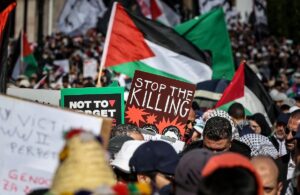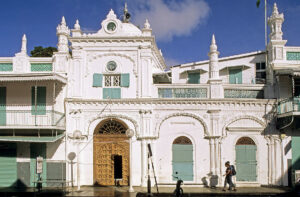Sri Lanka’s minorities – including its Christians and Muslims – have paid a high price for the state’s failure to protect them, writes Farah Mihlar in The Guardian.
As mass burials for some of the Christian worshippers killed in the Easter Sunday bombings take place today, claims that the attackers were local Islamic extremists have left Sri Lanka’s Muslims – who make up 10% of the population – devastated.
Although details are scant, and doubts exist about the official government account, a senior minister announced on Monday that the attackers belonged to a new fringe jihadist group, the National Thowheeth Jama’ath, that military intelligence had been aware of but had not acted against. Even amid news that Islamic State has claimed responsibility for the attacks, it is still unknown whether the bombers were homegrown or connected to international terror groups.
Yet again, Sri Lanka, especially its Christian minority, has paid a severe price for government failures. Muslims, already the target of hate campaigns, will no doubt face repercussions. Part of the tragedy is that since independence, Muslims have stayed away from violence, both during Sri Lanka’s civil war, and more recently, when they have been the target of religiously motivated attacks.
National Thowheeth Jama’ath has emerged from a wider movement. Tawhid, essentially meaning oneness with God, developed as an Islamic movement in Sri Lanka in the 1950s, but proliferated into several groups by the 1990s, largely backed by Wahhabi ideology imported by migrant workers returning from the Middle East, and some western-educated individuals. At the time, Sri Lanka was experiencing a resurgence in Islam promoted by a number of Islamic reform movements, which resulted in Muslims identifying more closely with Islam and expressing this through dress and behaviour.
The Tawhid groups were part of this process but took a more hardline position that mainstream Islam in Sri Lanka had been corrupted by other religious and cultural influences and needed to be purified. There were some tensions between different schools of thought, but crucially these reforms were peaceful and focused on Muslims: there was not even a semblance of violent extremism targeted at other religious groups.
Non-violence
During the civil war of 1983 to 2009, Muslims paid the price for their non-violence and avoidance of Tamil militancy. In the conflict-affected north and east of Sri Lanka they were killed, ethnically cleansed, abducted and displaced from their homes. At the end of the armed conflict they became the “new enemy” to both Sinhalese and Tamils, seen as an obstacle to political autonomy by the latter. With evangelical Christian groups, they were targeted by Sinhalese Buddhist extremist groups (operating with tacit government support) in systematic and widescale violent attacks and hate campaigns on social media.
Research I conducted across Sri Lanka from 2016 to 2018 showed rising distrust of Muslims: fears of a Muslim takeover through economic dominance and a high birth rate, often expressed through racial slurs, were part of popular discourse. Muslim civil society and religious leaders responded to these attacks by attempting to reduce the exclusivity of Islamic identity that had developed in the 1990s, opening mosques to non-Muslims and spearheading reconciliation. Clear and strong messages were sent through mosque networks aimed at preventing young Muslims from retaliating to attacks.
Claims of jihadist extremism within Sri Lanka’s Muslim community have occasionally been made, but at times as part of hate campaigns, which has made it difficult for community leaders to take them seriously. When they more recently realised the danger, they warned the police and called for arrests but no action was taken.
The Sri Lankan security establishment has failed to take appropriate action to prevent these attacks. The coalition government was elected in 2015 with support from minorities seeking respite from the previous government’s nationalist agenda, which enabled religious violence through impunity for its perpetrators. Yet utter incompetence by not acting on intelligence, and fissures between the president and his government preventing the latter from participating in national security briefings, have facilitated these attacks. Despite the horror of Sunday’s events, the country’s leadership remains unapologetic and divided.
When the civil war ended 10 years ago many of us working in human rights argued that peace could not be attained without justice and accountability for wartime atrocities. But postwar nation building has been devoid of justice for victims, minority protection and genuine reconciliation. The state security apparatus has allowed perpetrators to go unpunished.
The cycles of violence experienced in Sri Lanka’s recent history may be distinct, but they are connected by a thread of state failures, impunity, lack of justice and disregard for human rights. There must be accountability for all groups who have suffered atrocities in recent decades: Christians for Sunday’s attacks, and also Tamils, Muslims and Sinhalese for the violations they have faced through the years.
Ten years after the war ended it is clear that Sri Lanka remains in a state of conflict. This is the time for national reckoning. We need to rise above the narrow nationalistic and extremist positions held by all ethnic and religious groups, and build a peace premised on justice and equality for all.
- Farah Mihlar is a British/Sri Lankan Muslim human rights activist and academic.


